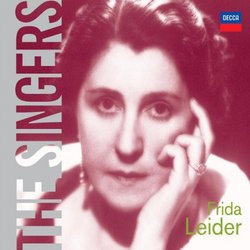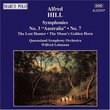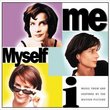| All Artists: Frida Leider Title: Singers (Dig) Members Wishing: 0 Total Copies: 0 Label: Decca Original Release Date: 1/1/2001 Re-Release Date: 9/18/2001 Album Type: Enhanced, Original recording remastered Genres: Pop, Classical Styles: Vocal Pop, Opera & Classical Vocal, Historical Periods, Classical (c.1770-1830) Number of Discs: 1 SwapaCD Credits: 1 UPC: 028946791127 |
Search - Frida Leider :: Singers (Dig)
 | Frida Leider Singers (Dig) Genres: Pop, Classical
|
Larger Image |
CD DetailsSimilar CDs |
CD ReviewsQuiet, Please! BobA. | 09/25/2002 (1 out of 5 stars) "This review is not about Ms. Leider and her great voice. It is about shoddy production values, namely London/Decca slapping a pile of 78's on a turntable with a reel to reel recorder going and transfering in all to CD. That is what you get, somwhere in that jungle of noise Ms. Leider is doing her best to be heard. If we could hear her I can imagine she is screaming "Hilf mich!" I have older recordings than these on CD, and they sound fresh and clear because the producers made a little effort to subdue the distortion and graininess. If you want Frida Leider, avoid London/Decca. This was the first and last of this series I will buy." An album to treasure from a great Wagnerian soprano Vincent Lau | 10/18/2001 (5 out of 5 stars) "If a competition were to be held for the greatest Wagnerian soprano of the 20th century, the prime contenders for the honour would probably be, in order of seniority, Frida Leider, Kirsten Flagstad and Birgit Nilsson. That Leider is less well-known by most music lovers is mainly due to the fact that her prime was in the 1920s and 30s such that there are now few around who have heard her "in the flesh" and that her recordings, made in comparatively primitive conditions and comprise of short excerpts, do not readily endear themselves to the general record collector.But what a voice she has! These recordings, made between 1921 and 1925, show a powerful singer-interpreter in her vocal prime. Her voice is warm yet gleaming at the top (the top Bs and Cs are mostly thrown out with ease), almost seamless throughout the range and coupled with a good command of legato phrasing (as can be gleaned from the not-too-idiomatic rendition of the Countess's "Dovo sono", here sung in German). The technical challenges in Beethoven's "Ah! perfido", Leonore's "Abscheulicher" and Weber's "Ozean, du Ungeheuer" hold no terror for her. According to reports, she was a wonderful Isolde, but the "Liebestod" here is slightly disappointing as the performers rush the music so that the track can fit in on one side of those primitive records. On the other hand, she shows much passion and inner depth in Kundry's "Ich sah das Kind", Elisabeth's "Dich, teure Halle" and part of Sieglinde's duet with Siegmund in Act I of Die Walkure (with the imposing Lauritz Melchoir as her partner). She proves herself to be a true daughter of Valhalla in the excerpts from Siegfried and Gotterdammerung (with Fritz Soot as Siegfried), although it is regrettable that no room can be made for Brunnhilde's Immolation Scene.On the whole, Leider has more passion in her vocal utterances than Flagstad and she is also more feminine and lyrical in her characterisation than Nilsson. Given the dates of the recordings, a certain amount of surface noise is to be expected. Yet, this cannot diminish the quality of Leider's performances, which are vocally glowing and dramatically compelling. This, therefore, is an album to treasure, and I do look forward to a follow-up from this new "The Singers" series. The CD also contains a profile and a photo gallery of the soprano, and these, as well as the sung texts, can be accessed via the CD-ROM drive of a home computer."
|

 Track Listings (12) - Disc #1
Track Listings (12) - Disc #1

